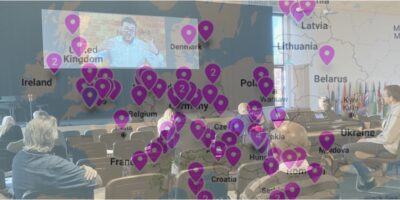As government and NGO delegates travel home this weekend from COP26, the Climate Change Conference in Glasgow, Christian leaders are preparing to connect online across Europe for the Lausanne Europe 20/21 Conversation and Gathering starting this Wednesday.
Planned to be held in Poland, the event has been forced online by the COVID-19 crisis. How will the environmental crisis highlighted in Glasgow be viewed in this first Lausanne Europe event of this generation? How will the corona crisis shape mission strategies in Europe? That will depend on whether we view the gospel as private or public truth.
In his plenary session on Thursday, Jim Memory will present his Europe 2021 missiological report surveying challenges and opportunities for missions in Europe today. Jim, whom I recently interviewed for a Schuman Talk, explains the political, economic, social, technological and environmental challenges and their implications for our mission agenda. How his session influences the other sessions, and the multiple conversations and discussions among the expected 800 participants, will depend on our understanding of the gospel.
I once attended a consultation of European mission agencies where Jim presented these crises. Two denominational leaders had been invited to respond how these challenges might shape the mission agendas of their churches. Both talked for 90 minutes about the work of their churches, without a word of reference to the issues Jim had raised. When asked specifically to comment on them, one shrugged and said, “Well, the important thing is saving souls, right?” Well, yes, that’s important. But is that the fullness of the good news of God’s kingdom?
Private truth?
Do we view the gospel basically as private truth, affecting individuals and their relationship to God, offering a ticket to heaven and out of the mess we find ourselves in on this planet?
This understanding of the good news leads to a mission approach focussed on ‘saving souls’: evangelism and church planting. Theological training will concentrate on evangelism, personal discipleship, Bible knowledge and church issues. All essential topics, granted.
But should we not also understand the gospel as public truth, true for the whole of the life of society and creation? Is not the good news of the Kingdom about God’s intention for all things under heaven and earth to be reconciled together in Christ as lord? Does it not mean ‘calling people to believe something which is radically different from what is normally accepted as public truth’, as mission statesman Lesslie Newbigin put it, calling for a conversion not only of the heart and will but of the mind?
All things
Isn’t this what Abraham Kuyper was claiming in his declaration made just 500 metres from where I sit to write in the heart of Amsterdam: There is not one square inch of human life where Christ, who is sovereign over all, does not say ‘Mine!’? Kuyper understood God’s mission, revealed from the first book of the Bible, as bringing all things under the lordship of Christ. All things. In education, politics, journalism and society, as well as the church.
This too was William Carey’s understanding of mission. Often called the father of modern missions, he not only engaged in Bible translation and church planting; he started the first newspaper in India, the first saving bank, the first lending library, the first school for boys and girls, introduced the first steam engine, the first private printing press, led a social justice campaign against widow-burning, started the Horticultural Society of India… and more!!
We readily declare Jesus to be Lord of all. But do our theological training courses match our confession? Where do we offer public theology courses to give young Christians biblical foundations to become subversive ‘Kingdom agents’ in politics, diplomacy, law, journalism, education, business, or social action?
May we at Lausanne Europe 20/21 affirm the gospel as public truth, to be acknowledged as true for the whole of the life of society, for the flourishing of life in Europe (and beyond) and seeking the common good for all?
P.S. Would you like to follow some of the plenaries sessions live online? Register here.
P.P.S. Did you miss the Schuman Talk with Thomas Schirrmacher last Tuesday? Catch it here.
Till next week,


